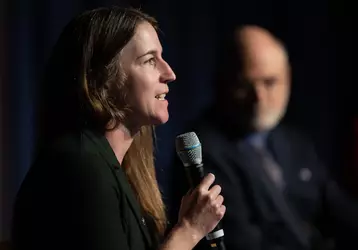The Trump administration’s actions in recent days have cast unprecedented uncertainty upon the climate panel’s work.

Katherine Calvin, NASA chief scientist and senior climate adviser, answers a question during a news conference to discuss the latest global temperature data at NASA headquarters in Washington, D.C., the United States, on Aug. 14, 2023. (Xinhua News Agency/Xinhua News Agency via Getty Images)
By Scott Dance
February 23, 2025 at 3:18 p.m. EST
The Trump administration has blocked work that is central to major international climate change research, and barred federal scientists and diplomats from attending a key global climate event in China next week, according to three sources close to the situation who spoke to The Washington Post on condition of anonymity because they were not authorized to speak publicly.
Katherine Calvin, NASA’s chief scientist and senior climate adviser, has been barred from traveling to China to meet with colleagues on work related to the next major report from the Intergovernmental Panel on Climate Change, a United Nations body that makes regular assessments about the state of the warming world. The next report is expected in 2029, and Calvin is leading one of three major IPCC working groups.
NASA also terminated its contract with a U.S. based group of scientists and staff who were working closely with Calvin to coordinate global efforts to craft the next assessment, essentially leaving one-third of the IPCC’s next report adrift with no staff assigned to pull it together.
The actions in recent days — the new administration’s most significant to curb government work on climate change, which President Donald Trump has called a “hoax” — have cast unprecedented uncertainty upon the climate panel’s work, which aims to synthesize the most up-t0-date human understanding of the planet’s warming and what can be done to stop it.
“The U.S. government is throwing a heavy amount of sand in the gears,” said Michael Oppenheimer, a professor of geosciences and international affairs at Princeton University who has been involved in every major IPCC report since the first one in 1990.
Neither IPCC nor White House officials could be immediately reached for comment Saturday.
Past IPCC reports have made clear that human burning of fossil fuels and the greenhouse effect have the planet on the brink of catastrophic levels of warming that have already decimated wildlife populations, harmed agricultural productivity, allowed infectious diseases to thrive and caused weather disasters to intensify.
Since the last major IPCC report was published in 2023, global average temperatures have soared to even higher extremes: Last year was the first in which global temperatures surged 1.5 degrees Celsius (2.7 degrees Fahrenheit) above preindustrial averages.
Based on decades of work by thousands of scientists around the world, the IPCC has long warned of massive global consequences if humans cannot stop temperatures from exceeding that threshold for years or decades at a time.
The group of 10 scientists and staff who were working under the NASA contract still have their jobs, the three sources said, but have been blocked from any IPCC-related work since Feb. 14.
They served as project managers for one of three main IPCC working groups, theirs focused on climate change “mitigation” — ways humans can reduce emissions of planet-warming gases or lower concentrations of those gases already in the atmosphere. The group is formally known as the Technical Support Unit for the IPCC’s Working Group III, and is based out of the Washington-based U.S. Global Change Research Program, created by Congress in 1990 to coordinate with 15 U.S. agencies on the government response to global environmental change.
The office is the only one supporting an IPCC work group that is based in the U.S. or supported by the U.S. government. Scientists working for two similar groups, focused on the science and the impacts of climate change, are largely based in France, China, the Netherlands and Singapore.
Calvin is the only one of six co-chairs of the three IPCC working groups who is from the United States. It is not yet clear whether she will be allowed to continue serving in that role. Calvin could not be reached for comment.
The meeting Calvin was barred from attending was scheduled to begin Monday in Hangzhou, China. There, scientists were set to finalize outlines for what the three working groups would contribute to the IPCC’s Seventh Assessment Report, as well as to review methodology on technologies that aim to remove carbon dioxide from the atmosphere and store it.
The outlines would guide work on dozens of chapters that will comprise the assessment. If they cannot be approved as scheduled this week, it will set back further work on the report, the sources said.
That includes the selection of hundreds of authors who craft each chapter of the report. That process cannot begin until the IPCC finalizes the next chapter’s outline.
The IPCC chooses the authors from a list of nominees provided during each cycle by the State Department and other diplomatic offices around the world. Typically, scientists from U.S. universities and government agencies make up a large proportion of report authors.
Source (Archive)